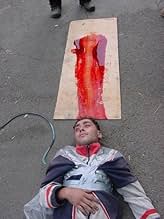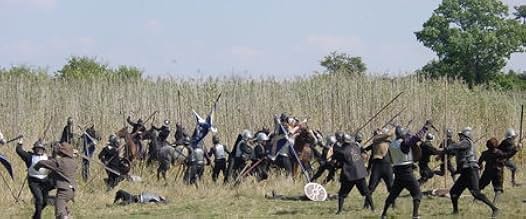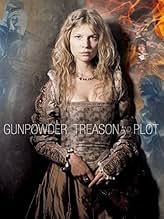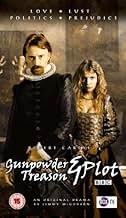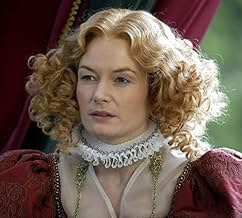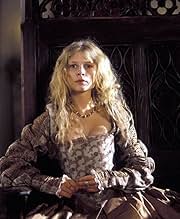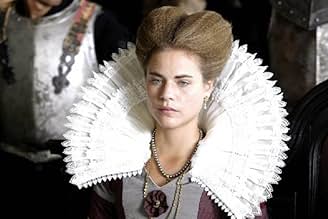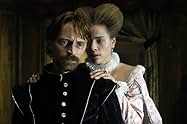Mini series depicting the turbulent and bloody reigns of Scottish monarchs Mary, Queen of Scots and her son King James VI of Scotland who became King James I of England and foiled the Gunpow... Read allMini series depicting the turbulent and bloody reigns of Scottish monarchs Mary, Queen of Scots and her son King James VI of Scotland who became King James I of England and foiled the Gunpowder Plot.Mini series depicting the turbulent and bloody reigns of Scottish monarchs Mary, Queen of Scots and her son King James VI of Scotland who became King James I of England and foiled the Gunpowder Plot.
- Awards
- 4 wins total
Featured reviews
Notable historical biopic about Mary Stuart and her confrontation with Elizabeth Tudor and other enemies. A decent and intelligent biography, lavishly produced by BBC and well directed by Gillies MacKinnon, although they are somewhat inappropriate when some roles speak to the camera. The cast was convincingly led by Clémence Poésy as the condemned Mary, Queen of Scots and Catherine McCormack as the cunning, Elizabeth I, as well as Robert Carlyle as the ruthlessly ambitious king James VI of Scotland and I of England.
Adding gorgeous costume design, stunning settings and production design. This turns out to be a typical British historical drama in which Clémence Poésy in the lead role and Catherine McCormack as her contender are finely cast. The excellent and large cast with prestigious British actors performing quite well through at an evocative historical set. The riots, loves and power struggles of his time are splendidly recreated here, including the most troubled days and the machinations that surrounded them.
The plot summary of the series made up of two parts in approximately 100 minutes each is the following: 1ª After the death of her husband Francis II of France in 1560, Mary, Queen of Scots (Clémence Poésy), is invited by the Queen Mother Catherine De Medici to leave the country and so it comes back to the homeland, her natal Scotland. As in neighboring England, many members of the nobility have embraced the Protestant faith. Additionally, the Catholic Mary has to deal with her Protestant and illegitimate half-brother James Stewart (Steven Duffy), Lord Moray's ruling ambition. Fearing that Mary has ambitions for the throne of England, Elizabeth I of England decides to weaken her claim by sending her favorite, the ambitious Robert Dudley , to court and marry Mary. Elizabeth also sends the young and pampered Lord Darnley (Paul Nicholls), from a powerful Catholic family. Tempted by the handsome Darnley, Mary impulsively chooses him to marry. Moray opposes the marriage, but Mary ignores him. But later on, May falls in love for Bothwell (Kevin McKidd), while the anger of the Protestant priest John Knox (Gary Lewis) increases.
2º-James (Robert Carlyle) was the son of Mary, Queen of Scots, and a great-great-grandson of Henry VII, King of England and Lord of Ireland, and thus a potential successor to all three thrones. He acceded to the Scottish throne at the age of thirteen months, after his mother was forced to abdicate in his favour. Four regents governed during his minority, which ended officially in 1578, though he did not gain full control of his government until 1583. King of England and Ireland as James I from the union of the Scottish and English crowns on 24 March 1603 until his death in 1625. Although he long tried to get both countries to adopt a closer political union, the kingdoms of Scotland and England remained sovereign states, with their own parliaments, judiciaries, and laws, ruled by James in personal union. In 1589, he married Anne of Denmark. Three of their children survived to adulthood: Henry Frederick, Elizabeth, and Charles. In 1603, James succeeded his cousin Elizabeth I, the last Tudor monarch of England and Ireland, who died childless. He continued to reign in all three kingdoms for 22 years, a period known as the Jacobean era, until his death in 1625. After the Union of the Crowns, he based himself in England from 1603, returning to Scotland only once, in 1617, and styled himself "King of Great Britain and Ireland". He advocated for a single parliament for England and Scotland. In his reign, supported by adviser Sir Cecil (Tim McInnerny), the Plantation of Ulster and English colonisation of the Americas began. At 57 years James's reign in Scotland was the longest of any Scottish monarch. He achieved most of his aims in Scotland but faced great difficulties in England, including the Gunpowder Plot (1605) in which conspiracy took place whereby rebels led by Guy Fawkes (Michael Fassbender), Catesby (Richard Coyle) attempted to blow up the English Parliament.
This interesting historical drama contains evocative cinematography that adds color to the atmosphere, as well as sensitive and attractive musical score, being efficiently directed. Other films that deal with these famous Queens are the following: ¨Mary of Scotland¨1936 by John Ford with Katharine Hepburn, Fredric March. ¨Elizabeth¨ (1998) by Shekar Kapur with Cate Blanchet, Joseph Fiennes. "Mary Queen of Scots" (2018) with Saoirse Ronan, Margot Robbie, Adrian Lester, Guy Pearce, Joe Alwyn, Gemma Chan. And TV series like ¨Elizabeth R¨ (1971) by Herbert Wise with Glenda Jackson. "Elizabeth I" Series (2005) by Tom Hooper with Helen Mirren, Jeremy Irons, Hugh Dancy, Toby Jones. And "Reinas" or "Queens" (2016-2017) with Olivia Chenery, Rebecca Scott.
Part one featured Mary Queen of Scots taking over in Scotland 1561. The sets were disappointing but it should be noted that IRL, MQS was less than thrilled with her Scottish royal accommodations after her raising in France. Characters were believable. Complaints about actor accents in period pieces are easy to set aside because IRL English royals mostly used French anyway.
This part had very little to do with the main half, except to take the story straight to the grown-up version of what MQS worked so hard to create, James 6+1, first king of combined Brits.
Part two has a new cast and shows religious strife around 1605. Minor characters make their cases straight to the camera, relieving us of time spent with their backstories... I'll take this exposition method. We learn the events creating the Guy Faukes UK holiday. As for the odd title: "English Folk Verse: Remember, remember!
The fifth of November, The Gunpowder treason and plot; I know of no reason Why the Gunpowder treason Should ever be forgot!"
historical events would make for an entertaining miniseries -- but you'd be
wrong. The writing stank, the history was worse than inaccurate, and I can
barely believe excellent actors such as McKidd and Carlyle were able to deliver some of their lines with a straight face. Historical inaccuracies aside, the story itself was delivered so disjointedly it was downright choppy -- almost as if an entirely different director and writer made each half. Skip this one.
Did you know
- TriviaThe title is taken from the nursery rhyme about Guy Fawkes and the Gunpowder Plot. Many versions of the rhyme exist, and its origins are unclear. But most begin with these lines: "Remember, remember / the fifth of November / the Gunpowder Treason and Plot. / I know of no reason / why the Gunpowder Treason / should ever be forgot."
- GoofsAt the beginning Mary is depicted as a young, unmarried girl who had spent 13 years in exile in France. Actually, she was a widow. She had been married to the French king who had died very young.
- Quotes
Bothwell: Forgive me.
Mary, Queen of Scots: How's your head?
Bothwell: Sore.
Mary, Queen of Scots: I could remove it for you.
Bothwell: Well, that would do the trick, aye.
Mary, Queen of Scots: You caused Lord Darnley great offense, you called Lord Darnley a long streak of English piss!
Bothwell: Then I must apologize.
Lord Darnley: I thank you.
Bothwell: 'Twas English *pish*.
Lord Darnley: [pause] Banishment, I think.
Bothwell: Anywhere but France.
Details
- Release date
- Countries of origin
- Official sites
- Language
- Also known as
- Conspiración, traición y muerte
- Filming locations
- Production companies
- See more company credits at IMDbPro
Contribute to this page


